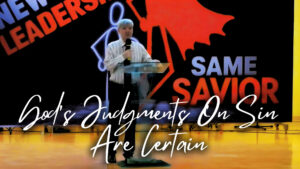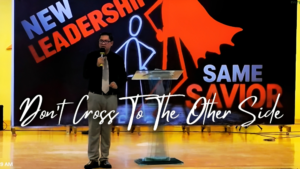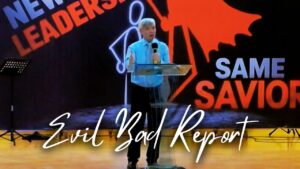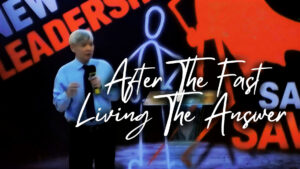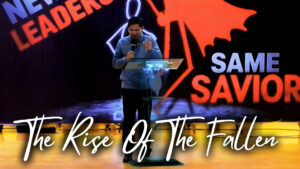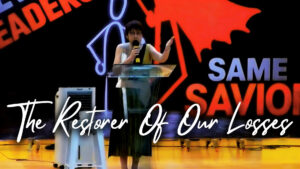Title: No Poor Among You
Scripture Reading: Deuteronomy 15:4-11
There should be no poor among you, for the Lord your God will greatly bless you in the land he is giving you as a special possession. You will receive this blessing if you are careful to obey all the commands of the Lord your God that I am giving you today. The Lord your God will bless you as he has promised. You will lend money to many nations but will never need to borrow. You will rule many nations, but they will not rule over you. “But if there are any poor Israelites in your towns when you arrive in the land the Lord your God is giving you, do not be hard-hearted or tightfisted toward them. Instead, be generous and lend them whatever they need. Do not be mean-spirited and refuse someone a loan because the year for canceling debts is close at hand. If you refuse to make the loan and the needy person cries out to the Lord, you will be considered guilty of sin. Give generously to the poor, not grudgingly, for the Lord your God will bless you in everything you do. There will always be some in the land who are poor. That is why I am commanding you to share freely with the poor and with other Israelites in need.”
Deuteronomy 15:4-11 is a fundamental topic that occupies the mind of many in this world, even, the children of God.
Deuteronomy 15:4-11 gives God’s vision for a just and compassionate society where poverty is addressed through generosity, release of debts, and openhearted care for the poor.
How does God address the ‘No Poor Among you’ in our church.
- God’s ideal: No Poverty
‘There will be no poor among you’ states the ideal situation.
God desires a society without poverty, made possible through His blessing and obedient living. The society addressed is the community of God’s people
His blessing – sovereignly imputed.
Obedient living – through following the commands of God.
In ancient Israel, God established an economic system in which no one had to be chronically poor. If people would obey the LORD, He would bless them (both sovereignly and because of their obedience), and there would be little chronic poverty in Israel.
God applies this same principle to people within the church.
Chronic Poverty: a condition in which individuals or households remain in poverty for an extended period, often for many years, decades and even across generations.
What drives this Chronic Poverty.
- Low education
- Limited or fragmented assets
- Dependence on low productivity, especially agriculture, fishing
- Large household size and high dependency ratios
- Disaster, conflict, and vulnerability which disrupt income and access to services
As Christian, Jesus had broken the curse of poverty.
Deuteronomy 15:4 – ‘No Poor Among you’
Deuteronomy 15:11 – ‘For the poor will never cease from the land.’
What is stated in God’s ideal in Deuteronomy 15:4-7.
A. ‘The Lord your God will bless you.’
B. ‘You will lend to many nations, but you will not borrow.’
C. ‘You will rule over many nations, but they will not rule over you.’
- Causes of Poverty among God’s people
God called us to obedience. If we obey Him, poverty would be eliminated.
God did not unconditionally guarantee prosperity for Israel, either on a national or individual basis.
The ideal is possible but not proven true among God’s people. Verse 15 gives the reason: obedience to the covenant.
God called us to obedience. If we obey Him, poverty would be eliminated.
God did not unconditionally guarantee prosperity for Israel, either on a national or individual basis.
The ideal is possible but not proven true among God’s people. Verse 15 gives the reason: obedience to the covenant.
‘If only you listen obediently’
‘To observe carefully all these commandments.’
In the New Testament, spiritual disobedience has consequences that lead to poverty-like conditions:
- Sinful living leads to brokenness, addictions, and loss.
- Ignoring biblical principes of stewardship, generosity, and work ethic can also lead to financial hardship. Gal 6:7 says, ‘Do not be deceived: God is not mocked, for whatever one sows, that will he also reap.’
- Open hands and open hearts
Deuteronomy 15:11 says, ‘There will always be some in the land who are poor.’ Jesus understood this truth where he said, ‘The poor you will always have with you.’
So how to react?
Verse 7 says, ‘Do not be hardhearted or tightfisted.’ It symbolizes emotional and financial resistance to helping others.
Verse 8 says, ‘be openhanded and freely lend,’ is not optional but part of covenant faithfulness to God. Verse 9 says, ‘don’t harbor this wicked thought’ is a sin rooted in greed and lack of trust in God’s provision. Because if this ‘needy person cries out to the Lord, you will be considered guilty of sin.’
What is God calling out?
A. Generosity toward the poor.
B. Generosity is not optional in God’s kingdom.
C. No selfish excuses.
D. Lifelong command to give freely. Giving is ongoing because the need is ongoing.
The poor and needy are not in a hopeless situation. The poor and needy are the special concern of God and the covenant family are expected to ensure the welfare of every member of the family. Israelites law was framed to protect the underprivileged.
Who then is this needy poor mentioned in verse 9?
- ‘One of your brothers.’ The Mosaic Law shows YHWH’s special concern and mercy to other poor covenant brothers/sisters.
In conclusion, God sent Christ, the greater man and his life echoes this teaching in Matthew 26:11, ‘The poor you will always have with you.’ He tells us to give and lend without expecting anything in return, because God Himself is merciful. Yet Christ became poor so that you might be rich. He died at the Cross so that this verse can be fulfilled, ‘I have come that you might have life and have it abundantly.’ He paid for our sin of disobedience, so that the curse of poverty can be broken. Today Jesus’ death has made possible for you to be rich in all aspect. And he still cares deeply for the poor and expect you to do the same. Generosity is tied to faith – trusting that God will provide and bless. Giving is not a moral action but a responsibility.
